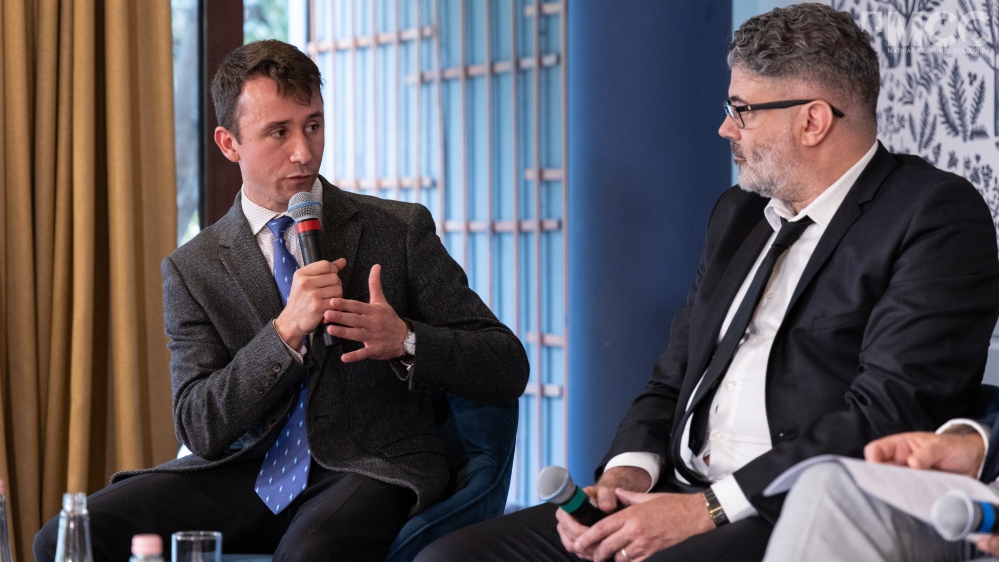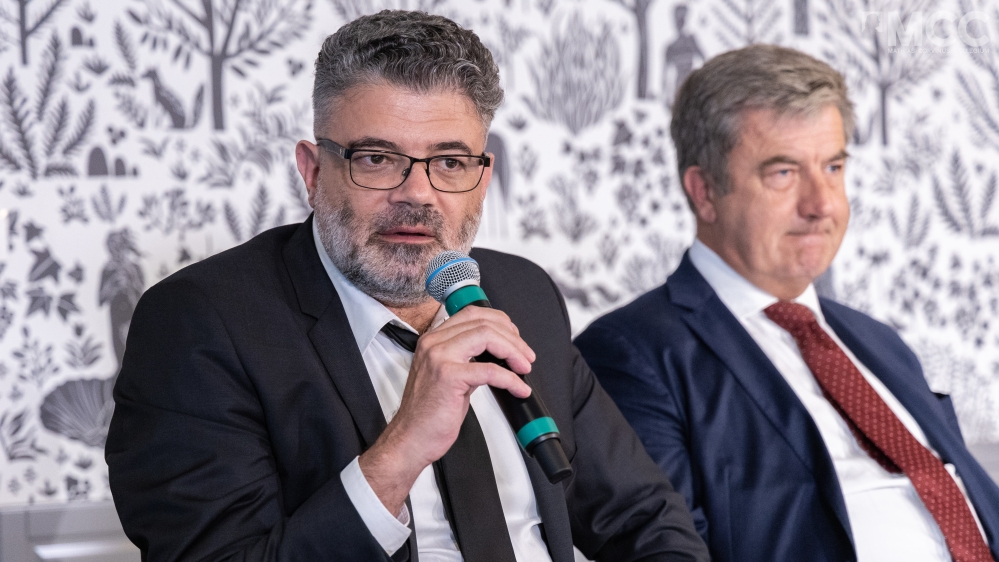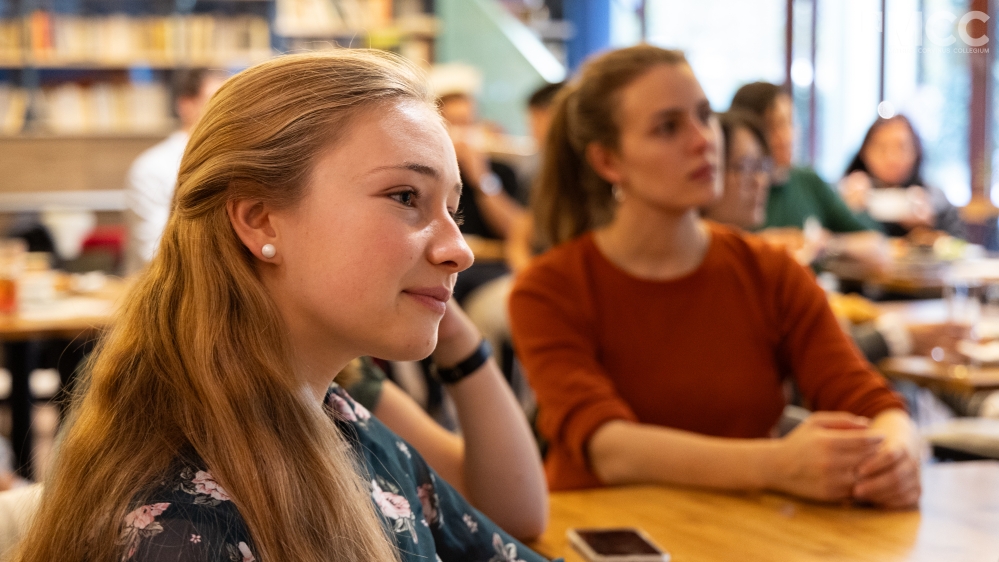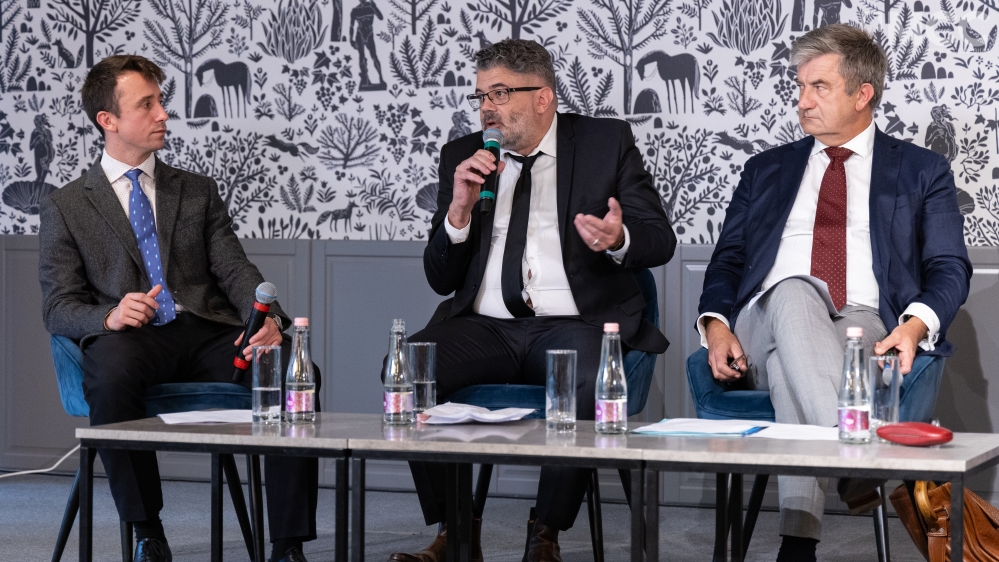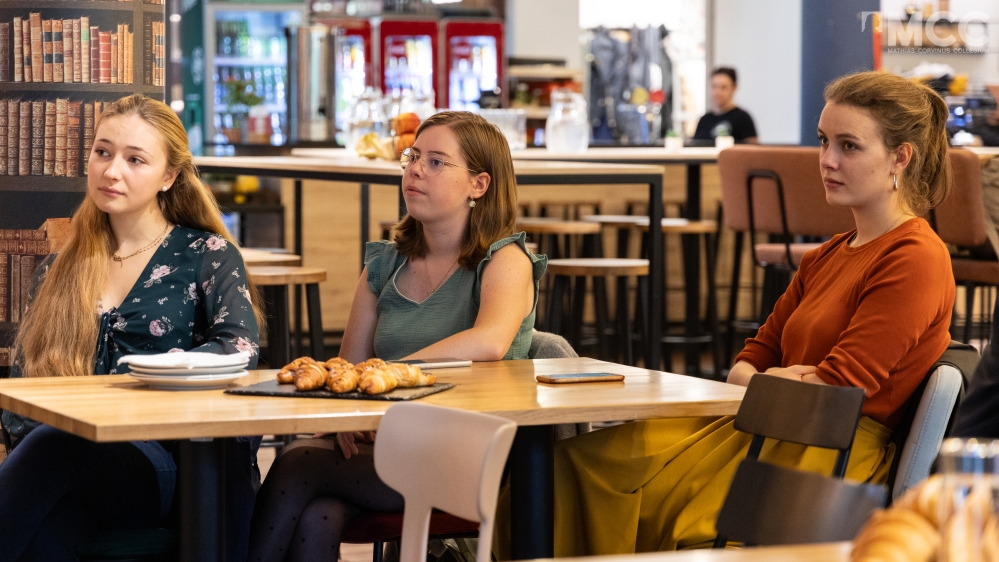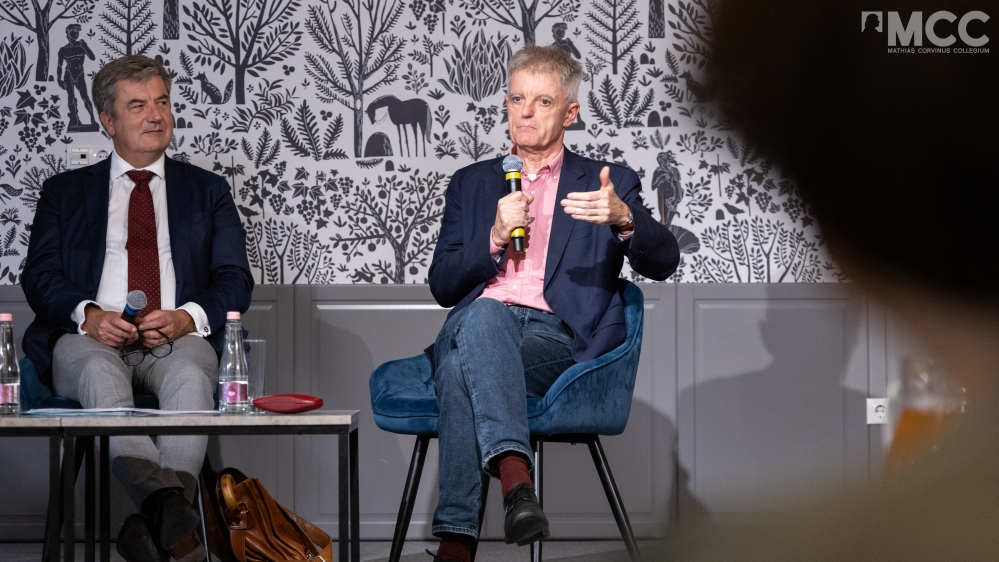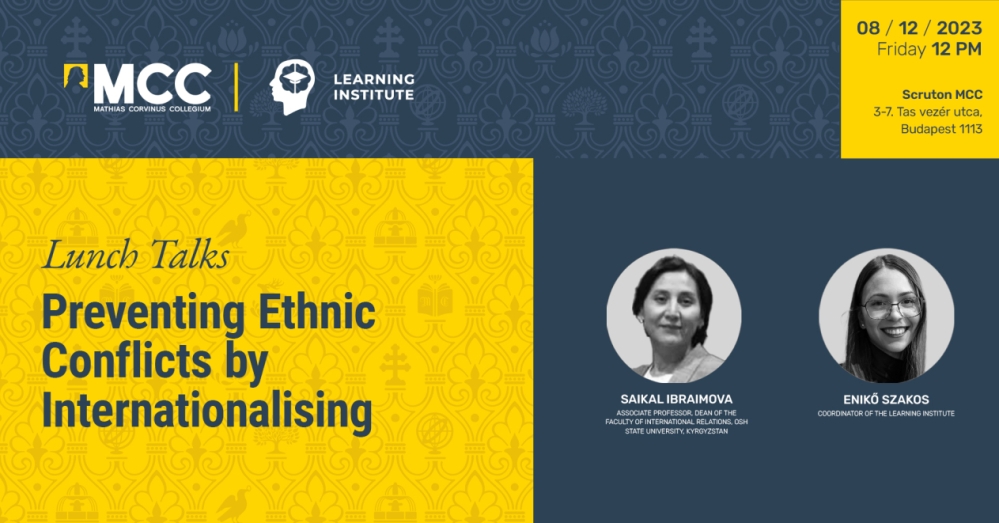On 20 October 2023 in a compelling podium talk on History education in France, the distinguished participants, Joël Hautebert, university professor of legal history, Yannick Jaffré, associate professor of philosophy and János Setényi, director of MCC Learning Institute shed light on the critical aspects of history teaching in France, Hungary and in Europe.
English
The event was moderated by Thibaud Gibelin, historian and political scientist from Paris Est-Créteil University who is also visiting fellow at MCC. The discussion delved into the evolving curriculum, teaching methodologies, and the broader societal impact of history education in France.
According to Yannick Jaffré there are three main eras of history education in France. The first one is around the 90s, which he calls the classical era with a traditional chronological approach. He defined the second era as deconstructionist era, whereas global trends dominate pedagogical methods. The third era in his view is something that can be called reformation and it is determined by microcosm and technocracy.
Joël Hautebert identified three main problems in the teaching of French history. Frist, he drawed attention to the fact that French history education does not follow a chronological order. He also stressed that history education in France highlights guilt and culpability, therefore suppresses positive feelings of identity and pride in students. Finally, he said that it is binary vision that governs the French pedagogy of history, thus it contrasts the different poles of society, such as men and women, and French and other nationalities. He emphasized that these problems put pressure on teachers, trainers and professors. This pressure is increasing in the light of migration and multicultural trends.
János Setényi explained that French history defines European history, therefore when French history education fails, the European heritage collapses. He also raised the issue that when history is not taught, other narratives and stories take its place.
As a result of the discussion, the speakers felt that ideologies are increasingly present in the everyday lives of teachers and educational institutions and that these ideologies are also putting pressure on the way history is taught. There was agreement among the participants of the podium that in order to properly identify ourselves it is important to know where we come from.
The discussion ended with the question of how to teach European history. The exchange of views highlighted that the teaching of European history is important, but not necessarily in the context of global trends. In Central Europe, nations know that their resources are limited and they need each other's support. As in other areas, cooperation and mutual learning are important in education. In France, there is no tradition of joint thinking with other countries in the field of education, so it is important to be able to adopt good practices from each other. Both top-down and bottom-up approaches should integrate existing good practices to ensure continuity.
-----
Magyar
2023. október 20-án a franciaországi történelemoktatásról szóló lenyűgöző pódiumbeszélgetésen a kiváló résztvevők, Joël Hautebert, a jogtörténet egyetemi tanára, Yannick Jaffré, a filozófia docense és Setényi János, az MCC Tanuláskutató Intézetének igazgatója a franciaországi, magyarországi és európai történelemoktatás kritikus aspektusaira világítottak rá.
A rendezvény moderátora Thibaud Gibelin, a Paris Est-Créteil Egyetem történésze és politológusa volt, aki egyben az MCC vendégkutatója. A beszélgetés a franciaországi történelemoktatás fejlődő tantervét, tanítási módszereit és szélesebb társadalmi hatását járta körül.
Yannick Jaffré szerint a franciaországi történelemoktatásnak három fő korszaka van. Az első a 90-es évek körül van, amelyet ő klasszikus korszaknak nevez, hagyományos kronologikus megközelítéssel. A második korszakot dekonstruktivista korszakként határozta meg, miközben a pedagógiai módszereket a globális trendek uralják. A harmadik korszakot szerinte reformációnak nevezhetjük, és ezt a mikrokozmosz és a technokrácia határozza meg.
Joël Hautebert három fő problémát azonosított a francia történelemtanításban. Először is felhívta a figyelmet arra, hogy a francia történelemoktatás nem követ kronológiai sorrendet. Hangsúlyozta azt is, hogy a franciaországi történelemoktatás a bűntudatot és a bűnösséget hangsúlyozza, ezért elnyomja a tanulókban a pozitív identitásérzést és a büszkeséget. Végül elmondta, hogy a francia történelempedagógiát a bináris látásmód határozza meg.Hangsúlyozta, hogy ezek a problémák nyomást gyakorolnak a tanárokra, oktatókra és professzorokra. Ez a nyomás a migráció és a multikulturális tendenciák fényében egyre nő.
Setényi János kifejtette, hogy a francia történelem meghatározza az európai történelmet, ezért ha a francia történelemoktatás kudarcot vall, az európai örökség összeomlik. Felvetette azt is, hogy amikor a történelmet nem tanítják, más narratívák és történetek veszik át a helyét.
A vita eredményeként az előadók úgy érezték, hogy az ideológiák egyre inkább jelen vannak a tanárok és az oktatási intézmények mindennapjaiban, és ezek az ideológiák nyomást gyakorolnak a történelemtanítás módjára is. A pódium résztvevői között egyetértés volt abban, hogy ahhoz, hogy megfelelően azonosulni tudjunk, fontos tudni, honnan jövünk.
A beszélgetés azzal a kérdéssel zárult, hogyan tanítsuk az európai történelmet. Az eszmecsere rávilágított arra, hogy az európai történelem tanítása fontos, de nem feltétlenül a globális tendenciákkal összefüggésben. Közép-Európában a nemzetek tudják, hogy erőforrásaik korlátozottak, és szükségük van egymás támogatására. Mint más területeken, az oktatásban is fontos az együttműködés és az egymástól való tanulás. Franciaországban nincs hagyománya a más országokkal való közös gondolkodásnak az oktatás területén, ezért fontos, hogy képesek legyünk átvenni egymástól a jó gyakorlatokat. Mind a felülről lefelé, mind az alulról felfelé irányuló megközelítéseknek integrálniuk kell a meglévő jó gyakorlatokat a folyamatosság biztosítása érdekében.

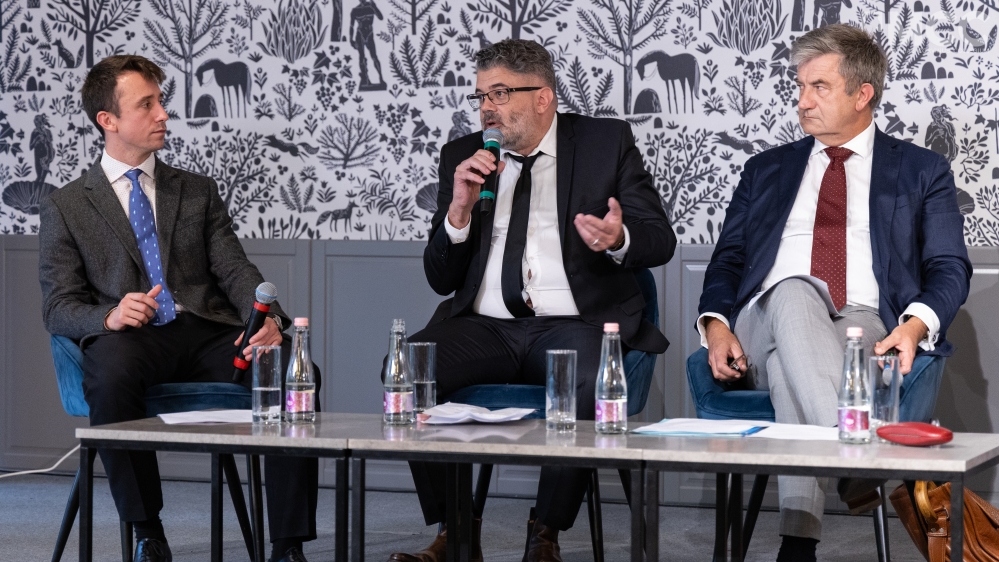
 October 20, 2023 at 2:30 PM – 3:30 PM
October 20, 2023 at 2:30 PM – 3:30 PM